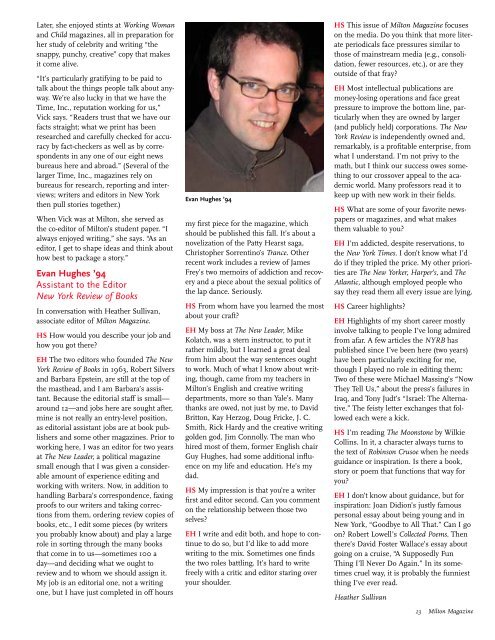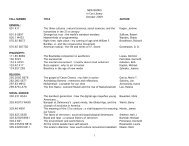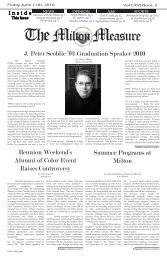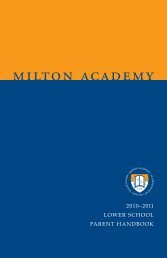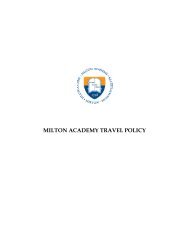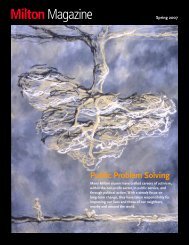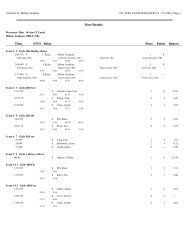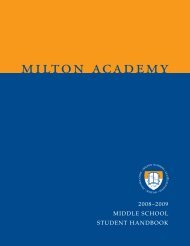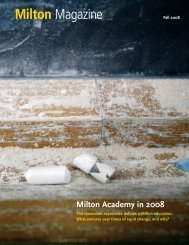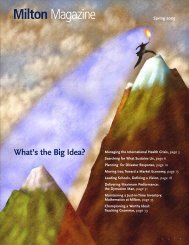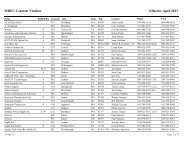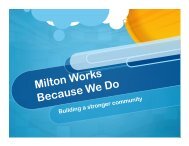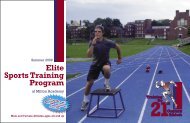“I’m glad when I touch a nerve and getreaders to think twice about something—I called out the recent Stealth for what Iperceived as an extremely callow portrayalof war during a time of war, and got a pileof email in response. Half was positive,half was negative, and the one that meantthe most was from an army intelligenceofficer saying I’d nailed it.“In a sense, I’m most proud of an interviewI did for the New York Times withdirector Godfrey Reggio about how muchtrouble he was having getting his final filmin his Koyaanisqatsi trilogy made. The articlewas read by director Steven Soderbergh(sex, lies, and videotape, Ocean’s 11), whoimmediately picked up the phone andoffered Reggio 100 percent funding.Having been the link that got a film madeis arguably more satisfying than writingany review.”The prominence and professionalism ofcriticism has risen but, Ty wrote in a July<strong>2005</strong> column, the number of bodies inseats at the cinema has dwindled. Whenconsidering why Americans shun cinemas,Ty wonders what could replace the experience:“How would movies make thatnecessary mass-market splash beforefragmenting onto DVD, cable, and ondemand?More critically, what would we doas a society without the shared narrativeexperience? Since before we started takingnotes and calling it history, human beingshave felt a yearning to sit in a crowd ofecstatic strangers and be awed by the bignessof stories. DVDs and a $4 bag ofM&Ms aren’t going to make that need disappear.”Before writing for the Globe, Ty wrote forHBO and Entertainment Weekly. He beganwriting about the movies when he beganwatching them: While at <strong>Milton</strong>, he filledhis journal with essays about his experienceas a movie-watcher. Despite his adoptionof a critical language and his academicstudy of Hollywood, Ty says, “I have towatch a movie the way most people do. Ican’t overthink it.”Vick Boughton ’73Senior EditorPeople MagazineIn a trivia game, before becoming a senioreditor at People magazine, Vick Boughtonwas the only player to know that MiaFarrow, as F. Scott Fitzgerald’s Daisy22 <strong>Milton</strong> MagazineVick Boughton ’73Buchanan, was on the inaugural 1974cover of People. Vick’s affinity for celebritynews, she says, began as a student atWellesley and continued at OxfordUniversity, where she scoured England forher favorite magazine and remembersbeing “crushed” when People was no longerimported.As a leader of the magazine’s “specials”sections—she helps manage a staff of 25—Vick is happily immersed in celebrity andAmerica’s fascination with it. Vick’s graduatework at Oxford was in ethnology, andshe says that that background has somebearing on her current work.“My sense is that readers think of themagazine’s coverage of celebrity-studdedevents, fashion and even beauty as entertainment.I hope so—it is entertaining.But, of course, one hallmark of People isthat along with the glossy fun stuff, thereare stories about real people going throughdifficult or interesting or joyous times.Some aren’t household names, but theirstories resonate with us. They educate us,infuriate us, inspire us. Who doesn’t wantto be involved with or feel a connection tothe subject they’re reading about? Otherwise,why bother?”Life inside People is also engaging. Vickpoints to Oscar night—during whichstaffers watch the broadcast and work forat least 18 straight hours—as a highlight.“You haven’t lived until you’ve experiencedOscar night around here,” says Vick. “Youhave all these smart, funny people in oneroom making hilarious observations. It’sthe ultimate Oscar party.”Vick’s department, separate from but workingin tandem with the People staff whodevelop weekly news and human-intereststories, produces the issues that focus on aspecial topic (hence, “specials.”) While theymight put out an issue focused on anythingfrom a hot television show such as“Desperate Housewives” to a “how-to” holidayentertaining guide, most magazinebuyerswill recognize “Sexiest Man Alive”and “50 Most Beautiful People” or “Bestand Worst Dressed” or “50 HottestBachelors” as among the favorite specialissues. Orlando Bloom was last year’shottest bachelor, in case you missedthat one.Vick says that while many top picks areentertainers or athletes of note—JohnnyDamon, who Vick says has the “best hairin baseball,” made the cut last year, andhaving a recent notable project helps one’schances—not all of the men featured arerich and famous. (She says that for someoneto earn a “sexiest man alive” designation,however, it really “has to be the guy’smoment.”)The magazine also likes to introducefresh faces, according to Vick. She tells ofone of the “regular guys” who madethe list recently. Last year, a top aide ofCondoleezza Rice was featured among thebachelors. The piece quoted the now-Secretary of State as saying that her aideshould spend more time out of the officehaving a little fun.“We think a lot about our audience—whatwe feel we owe readers, what we think theyshould know about,” says Vick. With areadership of nearly 40 million, which surpassesthat of Newsweek or Time, People’saudience clearly likes the magazine’s mixof news, features and celebrity tattle.“Our celeb coverage offers readers a lot tochew over. I think a lot of people can relate,say, to Jennifer Aniston’s recent breakupwith Brad Pitt. Theirs appeared to be theperfect marriage, they seemed devoted toone another, they were both huge starswith plenty of work on their plates. Andyet, things ultimately fell apart,” Vick says.“They’re human—they go through criseslike the rest of us. Again, there’s thatengagement, that involvement along withthe entertainment.”Besides her tenure at People, Vick is a 13-year veteran of Sports Illustrated, where sheworked as a reporter and senior editor.
Later, she enjoyed stints at Working Womanand Child magazines, all in preparation forher study of celebrity and writing “thesnappy, punchy, creative” copy that makesit come alive.“It’s particularly gratifying to be paid totalk about the things people talk about anyway.We’re also lucky in that we have theTime, Inc., reputation working for us,”Vick says. “Readers trust that we have ourfacts straight; what we print has beenresearched and carefully checked for accuracyby fact-checkers as well as by correspondentsin any one of our eight newsbureaus here and abroad.” (Several of thelarger Time, Inc., magazines rely onbureaus for research, reporting and interviews;writers and editors in New Yorkthen pull stories together.)When Vick was at <strong>Milton</strong>, she served asthe co-editor of <strong>Milton</strong>’s student paper. “Ialways enjoyed writing,” she says. “As aneditor, I get to shape ideas and think abouthow best to package a story.”Evan Hughes ’94Assistant to the EditorNew York Review of BooksIn conversation with Heather Sullivan,associate editor of <strong>Milton</strong> Magazine.HS How would you describe your job andhow you got there?EH The two editors who founded The NewYork Review of Books in 1963, Robert Silversand Barbara Epstein, are still at the top ofthe masthead, and I am Barbara’s assistant.Because the editorial staff is small—around 12—and jobs here are sought after,mine is not really an entry-level position,as editorial assistant jobs are at book publishersand some other magazines. Prior toworking here, I was an editor for two yearsat The New Leader, a political magazinesmall enough that I was given a considerableamount of experience editing andworking with writers. Now, in addition tohandling Barbara’s correspondence, faxingproofs to our writers and taking correctionsfrom them, ordering review copies ofbooks, etc., I edit some pieces (by writersyou probably know about) and play a largerole in sorting through the many booksthat come in to us—sometimes 100 aday—and deciding what we ought toreview and to whom we should assign it.My job is an editorial one, not a writingone, but I have just completed in off hoursEvan Hughes ’94my first piece for the magazine, whichshould be published this fall. It’s about anovelization of the Patty Hearst saga,Christopher Sorrentino’s Trance. Otherrecent work includes a review of JamesFrey’s two memoirs of addiction and recoveryand a piece about the sexual politics ofthe lap dance. Seriously.HS From whom have you learned the mostabout your craft?EH My boss at The New Leader, MikeKolatch, was a stern instructor, to put itrather mildly, but I learned a great dealfrom him about the way sentences oughtto work. Much of what I know about writing,though, came from my teachers in<strong>Milton</strong>’s English and creative writingdepartments, more so than Yale’s. Manythanks are owed, not just by me, to DavidBritton, Kay Herzog, Doug Fricke, J. C.Smith, Rick Hardy and the creative writinggolden god, Jim Connolly. The man whohired most of them, former English chairGuy Hughes, had some additional influenceon my life and education. He’s mydad.HS My impression is that you’re a writerfirst and editor second. Can you commenton the relationship between those twoselves?EH I write and edit both, and hope to continueto do so, but I’d like to add morewriting to the mix. Sometimes one findsthe two roles battling. It’s hard to writefreely with a critic and editor staring overyour shoulder.HS This issue of <strong>Milton</strong> Magazine focuseson the media. Do you think that more literateperiodicals face pressures similar tothose of mainstream media (e.g., consolidation,fewer resources, etc.), or are theyoutside of that fray?EH Most intellectual publications aremoney-losing operations and face greatpressure to improve the bottom line, particularlywhen they are owned by larger(and publicly held) corporations. The NewYork Review is independently owned and,remarkably, is a profitable enterprise, fromwhat I understand. I’m not privy to themath, but I think our success owes somethingto our crossover appeal to the academicworld. Many professors read it tokeep up with new work in their fields.HS What are some of your favorite newspapersor magazines, and what makesthem valuable to you?EH I’m addicted, despite reservations, tothe New York Times. I don’t know what I’ddo if they tripled the price. My other prioritiesare The New Yorker, Harper’s, and TheAtlantic, although employed people whosay they read them all every issue are lying.HS Career highlights?EH Highlights of my short career mostlyinvolve talking to people I’ve long admiredfrom afar. A few articles the NYRB haspublished since I’ve been here (two years)have been particularly exciting for me,though I played no role in editing them:Two of these were Michael Massing’s “NowThey Tell Us,” about the press’s failures inIraq, and Tony Judt’s “Israel: The Alternative.”The feisty letter exchanges that followedeach were a kick.HS I’m reading The Moonstone by WilkieCollins. In it, a character always turns tothe text of Robinson Crusoe when he needsguidance or inspiration. Is there a book,story or poem that functions that way foryou?EH I don’t know about guidance, but forinspiration: Joan Didion’s justly famouspersonal essay about being young and inNew York, “Goodbye to All That.” Can I goon? Robert Lowell’s Collected Poems. Thenthere’s David Foster Wallace’s essay aboutgoing on a cruise, “A Supposedly FunThing I’ll Never Do Again.” In its sometimescruel way, it is probably the funniestthing I’ve ever read.Heather Sullivan23 <strong>Milton</strong> Magazine
- Page 3 and 4: 283440Journalism at Milton24 Studen
- Page 6 and 7: One piece of AOL programming that h
- Page 8 and 9: puter) and read a piece. Bored? Pro
- Page 10 and 11: decrease in the amount spent on res
- Page 12 and 13: “The biggest change is corporatei
- Page 14 and 15: Jesse Sarles ’93“It’s a flexi
- Page 16 and 17: Felicia Taylor ’82Ned Roberts ’
- Page 18: “I don’t go through a lot of me
- Page 21 and 22: This summer, Peter was in the midst
- Page 23: Ty Burr ’76“On one level what I
- Page 27 and 28: were what to get into at Milton. Ma
- Page 29 and 30: Charlie Riggs, Abby Padien-Havens,
- Page 31 and 32: They say that the tough part was th
- Page 33 and 34: Co-editors of La Voz, 2005:Emma San
- Page 35 and 36: In its three to four annual issues,
- Page 37 and 38: 6 Sam Minkoff ’06 andJamal Sabky
- Page 39 and 40: Student graduation speakers Tanner
- Page 41 and 42: The Robert L. Daley PrizeCreated by
- Page 43 and 44: 1 Llewellyn Howland ’552 Derick F
- Page 45 and 46: 11 Robin Robertson with the MiltonM
- Page 47 and 48: The Head of SchoolMilton’s Magazi
- Page 49 and 50: I began to inventory the sensations
- Page 51 and 52: Hadley Davis Rierson ’89speaking
- Page 53 and 54: Emmy Norris is a prowler for “cul
- Page 55 and 56: A collection of symbols, none more
- Page 57 and 58: Middle School Tackles Complex Probl
- Page 59 and 60: Gratwick Performersdents prior to t
- Page 61 and 62: He changed his mind, though,soon mo
- Page 63 and 64: Creating Cityscapes:Third-grade stu
- Page 65 and 66: New Roles for Milton Faculty Member
- Page 67 and 68: Hugh R. SilbaughUpper School Princi
- Page 69 and 70: Academy. Jorge was singularlyfocuse
- Page 71 and 72: There are many variations foreach s
- Page 73 and 74: Class of 1950, front row (left to r
- Page 75 and 76:
Class of 1955, front row (left to r
- Page 77 and 78:
Class of 1980, holding banner (left
- Page 79 and 80:
Class of 1990, front row (left to r
- Page 81 and 82:
Class of 1995, front row (left to r
- Page 83 and 84:
Margaret Creighton WilliamsMargaret
- Page 85 and 86:
The Lexi Rudnitsky Poetry Projectsp
- Page 87 and 88:
Milton AcademyBoard of Trustees, 20


